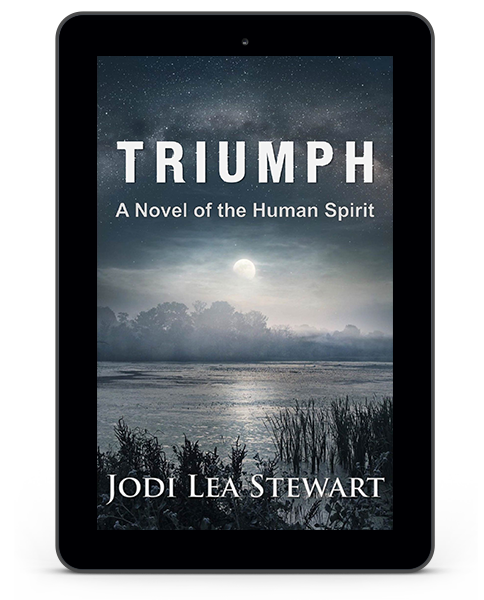Seething with old prejudices, wealth, poverty, voodoo, and young hot blood, TRIUMPH, a Novel of the Human Spirit will take you through the Louisiana swamps, New Orleans, the Texas prairies, and into the bustling but racially troubled city of St. Louis in the mid-twentieth century . . . and lead you to a place where people are accepted because of character and heart—nothing more, nothing less.
Triumph
A Novel of the Human Spirit
by Jodi Lea Stewart
Genre: Historical Fiction
At a time when the world needs more warmth and acceptance, two little girls – Mercy and Annie, take us on a journey where color doesn’t matter, and character and heart are the only things that do!
Deep in the Louisiana swamps, 1903, five-year-old Willy is kidnapped by a Vodou Priestess. One day, he will fight bloody battles in France and come face-to-face with the horrors of Vodou.
In
bustling New Orleans, 1903, bachelor Jack—a former Texas Ranger—has
an encounter with a young beauty hiding in his hotel room. What she
wants and needs will change his life forever.
1958
St. Louis, two girls of different races, Mercy and Annie, meet in the
fifth grade. Together, they secretly explore St. Louis via bus and
streetcar, encountering cultural prejudices at every turn—
including from within one girl’s own family. The turbulent times
and the Civil Rights Movement will test the girls’ loyalty and
affect their choices on
In
a saga spanning from 1903 to 1968, compelling characters navigate the
stormy paths of life in New Orleans, St. Louis, and Texas until they
all collide in a startling and dramatic way.
Editorial Reviews
Review
*5-star rating by
K.C. Finn, Reviewer with "Reader's Favorite"*
"Author
Jodi Lea Stewart has crafted a mighty tale that packs a huge
emotional punch, and you can feel its impact on every page of this
excellent novel. The central protagonists, Mercy and Annie, could not
be more different on the page, and the dialogue and descriptive work
put into this distinction are effective and highly imaginative. It is
the twisting events of the intriguing and unusual plot line that
brings out their similarities and the true human spirit, which is a
wonderful thing to become more and more invested in as the story
continues. The historical atmosphere of the piece was also vividly
portrayed. I really adored St. Louis in a time of such progress, yet
so much tension. Overall, I would definitely recommend TRIUMPH,
a Novel of the Human Spirit to readers who enjoy historical
sagas that deliver on friendship, hope, and heart.
Written for
an adult readership, the work does contain graphic scenes and some
disturbing imagery that is relevant to the present danger of the
plot."
* Five Stars for Jodi Lea
Stewart's latest literary treasure*
"In her new
book, TRIUMPH, prolific author, Jodi Lea Stewart,
brilliantly tackles a lineup of some of the toughest literary
challenges a writer can face. Writing in the present tense. Telling a
dual time frame story. Dealing with dialect. Writing from a young
protagonist's perspective. And, the most challenging of all--shedding
a light of hope and encouragement on the most incendiary social
concern of our nation--racism. Ordinarily, in the hands of a less
skilled writer, any one of these could be the kiss of death of a
novel. That's not the case with Stewart. The characters are
compelling and believable. The settings are powerful and rendered
with a touch of uncanny realism. The literary magic spell Stewart
casts over this story is so effective, you do not realize the
commanding lesson it teaches until you close the cover and replay all
the clever and endearing elements that make it so
thought-provoking.
I have read Stewart's other books, and I am
always pleasantly surprised at her ability to deliver her deep
universally themed messages wrapped in disarmingly simple
premises."
~ DB Jackson, Author, Screenwriter,
Winner of the WesternHeritage Award
*5-star Review by Cyrus
Webb - Media Personality, Author, and Top-Amazon
Reviewer*
"In TRIUMPH, author Jodi Lea
Stewart shows that time and place have nothing to do with the
power of the human spirit. The reader will see themselves in
characters that might not look like them but carry their desire to
rise and thrive--and therein lies its power and a lesson..."
Reviewed by Ruffina Oserio for Readers'
Favorite
Review Rating: 5 Stars - Congratulations
on your 5-star review!
A beautiful story that is deftly
told, Triumph is set over long years and has the reader drifting
through different timelines and across different cities. The author
writes about three storylines in the novel and combines different
narrative voices, including an irresistible first-person narrative
voice that stays with the reader throughout. The lyrical writing,
coupled with the apt use of the local accent, enriches the story and
augments the realism that permeates it. The reader can picture the
characters and know about their background from how they speak. The
author handles themes that are as relevant and sensitive to
contemporary readers as these were to characters since 1903. This is
one of those novels that compel readers to think about one of the
pressing problems of America: the color line. And it also asks
serious questions about identity. Triumph: A Novel of the Human
Spirit is a powerful testimony that we can outgrow the pettiness that
defines people by their color and see a human spirit behind the shade
of skin.
From the Author
TRIUMPH, a Novel
of the Human Spirit is extra special to me for many reasons,
not the least of which is because it exemplifies my personal feelings
about ethics and the differences in human beings as something to be
celebrated, not feared or hated. The keys are always respect
and acceptance regardless of race or creed or whatever the
world wants to call "imperfect" or "different."
Other
sub-reasons for writing this novel were to highlight life in St.
Louis and beyond in the 1950s and early 1960s. I wanted to expose
some of the dangers (okay, the horrors) lurking in old New Orleans,
honor the Texas Rangers, and express my respect for people who learn
how to overlook the color barriers that separate and dishonor us as
people.
TRIUMPH, a Novel of the Human Spirit is for readers who enjoy high-concept books written with a literary pen, and those who wish to see justice fulfilled and old prejudices shattered.
Amazon * B&N * Bookbub * Goodreads
36.
Can’t Beat Some Righteous Sense in ‘Em
1914
Kingston-Farm Stables, Kentucky
The knuckles hurtling toward his face are calloused and scarred. That’s all Willy has time to notice before they plow into his jaw, slamming his head into the boards of the horse stall. Instantly, he is jerked by the collar from the hay-covered floor and thrown through the open stall door. He lands crumpled, partially on his right shoulder, in the alley of the stables. Dizziness overtakes him as he dimly counts the horse legs under the bottoms of the other stall doors.
“Get off this property. Come back, and I’ll kill you if you do, you hear?” snarls the large lout now straddling Willy’s long, lanky body. A dilapidated boot covered in horse manure and straw is planted near Willy’s head. The man raises it and brings it down on the side of Willy’s face. Everything goes dark.
Rain. Dripping off his nose onto his hand wedged under the side of his face. Willy is lying on his good side, not the one smashed by Murdock. He stirs. Pain shoots through his head and settles back as tiny torches behind each eyelid. He wants to open his mouth, but it feels unhinged. He attempts to rise. Doesn’t make it. Tries again. Sits up groaning. His face doesn’t feel natural. His lips don’t fit right. His eyes won’t focus. His shoulder aches with searing pain. His stomach and chest burn. He tries to reason out his situation but can’t.
Thirty feet below him, the friendly lights inside and out of the Kingston-Farm Stables create a halo in the wet darkness. He has been dragged and thrown under the massive fiscus tree on the hill overlooking the barn.
“Glad you ain’t dead, Willy.”
It’s Jedediah, the elderly groomsman for Lightning Rod, the horse Willy was assigned to as an exercise boy several months ago. His ability to handle and calm the horses has not gone unnoticed, and he was up for a promotion for an assistant trainer. His height disqualifies him from becoming the jockey he always dreamed of becoming. He learned that the first week he ran away to Kentucky. To his dismay, he continues to shoot up, probably almost six foot by now.
“That damn’ol Murdock woulda stomped more’n your face and chest if I hadn’t stirred the horses up. Made him think about something else, Willy boy,” the old man says. “That shore was a bad thing happened tween the horses, but it ain’t no call to snap your bones like a tree limb, no sir. That don’t solve nothing, I say. Can’t beat some righteous sense into ‘em. No, you gotta learn them boys like you just beginnin’ in this bizness. Show ‘em. That’s what I say.”
Willy made a critical error earlier when he pushed a gate closed, didn’t turn around to secure it, went inside the tack room to get the exercise leads. Magic Night, the newest pride and joy of the stable owner, was in the process of having his halter switched to a bridle by a new groomer when he spied his opportunity to challenge Lightning Rod. He broke free and lunged through the half-open gate. An instant and ferocious fight broke out between the two thoroughbreds with Magic Night coming out the loser.
As Magic Night was led away severely limping, Murdock sent Jedediah to take over the still proud and snorting Lightning Rod. He called Willy inside the barn, fired him, beat him, and made some of the men drag him out of his sight.
“Lightning Rod, uh, he, I . . .” Willie moans, his head throbbing.
“Don’t you try using no words, son. No sir, you be still whiles I gets you a wet rag for that poor face of yorn. I gotta get you to Doc Ravensport soon’s you can walk. You been out cold for hours, young’un. Lighning’s okay, don’t you worry none about him. Whatcha doin’ there, boy, you passing out on me again?”
From deep within the darkness, Willy hears singing.
Danse Calinda, boudoum, boudoum.
Danse Calinda, boudoum, boudoum.
“Mam!” he shouts. “Mam, I got some frogs.”
“Sha-hush, boy. You’s in our care now. Old Big-Bob and me, we’s getting you to the doctor quick as this wagon’ll take us. There now, try keeping that rag on your face. Law, if you ain’t a sight,” Jedediah mutters.
“Mama, mama, mama, come get me! Daddy, where are you? Zeke?”
“Big-Bob, this boy’s gone teched in the head, he has,” Jedediah says. “Best to hurry this wagon along.”
37.
Doctor John
1962
St. Louis, Missouri
I take another swallow of iced tea and look at Mercy over the top of the glass. “But why do people think it’s so special and magical?”
“It’s steeped in superstition, Annie, and things like that get rooted in a culture and become as natural as breathing.”
“Speak regular, please, for us peons.”
Mercy laughs. “I am, you goose.”
Mercy is spending the night with me to catch me up on everything she’s been up to recently. She returned yesterday from New Orleans after a trip to Florida with her dad and grandpa to see where the Freedom Riders had stayed when they were there last year. Mercy loves anything to do with squashing injustice, and she said the Freedom Riders were the best kind of heroes. From what she told me about them, I agree.
She said all they were trying to do was make it possible for colored people in the South to ride on buses or trains or streetcars and sit where they wanted to. They wanted the normal privileges of eating at a lunch counter or using a restroom like everybody else. I have no idea why they can’t, and it was horrible learning what all happened to those good people. One man had fifty stitches on his head after some of those Klan men beat him. I gagged hearing about it.
While they were in Florida, she got to meet a man named Martin Luther King, Jr., a friend of her grandpa. She said he’s the most wonderful, dedicated man she’s ever met, and that surprised me she’d think he was the most anything since her family has so many special people in it.
A big rally was happening the next night, but her dad and grandpa wouldn’t stay and let her attend it. They said she was too young for that kind of dangerous heroism. It made her so mad, she didn’t speak to them the rest of the day, just rode along in the back of that beautiful convertible of Grandpa Grafton’s with her headscarf on and her nose in the air. It was, she said, the first time she ever wished she wasn’t beholden to anyone on this earth, not even her family.
“Someday, I’ll join the fight and no one can stop me,” she told me.
I believe her, too.
In New Orleans, she saw shop after shop with windows crammed with the crazy candles and powders and whatnot like we saw that time in the New Awlins Candle and Magic Shop when we were in the fourth grade. They put fake skulls and lots of black or purple material in their windows there and don’t mind doing it, she said.
“Mercy, tell me again what that gris-gris is used for.”
“Pronounce it like gree-gree, Annie, and think Vodou, black magic, spells, all that. Basically, it’s a little bag stuffed with an assortment of things like herbs, stones, small animal bones, powders. I saw one advertisement saying their gris-gris bags had graveyard dust in them.”
“No!”
“Yes.”
“Remember the gris-gris that weird shop man gave you in your sack that day?”
“Sure. We opened it on the bus sitting in the very back seat. It had that little bird amulet, a little statue of Saint Peter, and a strip of paper saying Jesus and Doctor John would bring me good luck if I kept that bag under my pillow.”
“I actually forgot all about that thing. It was spooky. What did you do with it?”
“What do you think? I put it under my pillow.”
We both laugh, and I pour more tea into Mercy’s glass.
“Then Mama found it when she was changing my bedsheets because I forgot to hide it that morning. She and Grandpa Grafton had a big talk with me that night about the dangers of messing with the black arts. They made me throw it in the fireplace.”
“You never told me.”
“I didn’t think it was that important. I mean, I don’t believe in any of it, so what was the big deal?”
“Who is that Doctor John guy, anyway? That little paper in your gris-gris bag said Jesus and Doctor John.”
Mercy rubs her palms together like she has a great secret to share. “Well, while Daddy and Grandpa were in our hotel, the Royal Sonesta, having lunch, I said I wasn’t hungry. I had noticed a bookstore just down from the hotel, and I snuck in there and read about Doctor John. I kept hearing his name mentioned, saw some shops named after him, and I was so curious. I remembered that slip of paper in the gris-gris bag from so long ago.”
“Did you learn anything about him?”
She rolls her eyes. “Really, Annie, you know me well enough to know I’m always going to find what I go after.”
Yes, that’s Mercy, for sure.
“Anyway, Doctor John, also called Bayou John, was a big deal in the Voodoo world in the 1840s—a man of color, a witchdoctor who said he was a Senegalese prince. Apparently, his face was full of awful scars that he said his father, a king, had done to him because it was a royal tradition in their country.”
I’m sitting listening with my mouth open. It’s like reading a book. “What else?”
“Well, he hated mixed-bloods for some reason, and he also owned slaves, but they had to be pure-blood coloreds. He married many of them and got so much money lifting curses and doing ceremonies, he built a house on Bayou Street. He sold gris-gris, conducted healings, did astrological readings. And, listen to this . . . wealthy white ladies wearing veils so they wouldn’t be recognized came in droves wanting advice concerning love affairs. They bought little bottles of his very expensive concoctions to use in capturing beaus or leaving them or whatever they needed it to do. You know what? I bet it was nothing more than old swamp water in those vials.
“One book said his house was full of snakes, lizards, embalmed scorpions, animal skulls, and human skulls stolen from graveyards.”
“That’s just plain evil, Mercy.”
“Yeah, I suppose so, but you have to admit . . . it’s interesting!”
She giggles and slips out of the chair to sit cross-legged on the floor of the screened-in porch.
“I really like Joe’s house, Annie. It’s nice. I love this porch, too. It’s the best for keeping mosquitos and June bugs off of us, and it’s like we’re sitting outside at the same time. I wish our porch was screened.”
“My brothers and me getting our own rooms was like a miracle, and Momma loves the kitchen. She cooks all the time now.”
“Does she work with Joe at the coffee shop?”
“She likes to go help sometimes when it’s really busy before holidays, some weekends when there’s special events in town. Stuff like that. He’s lets her do whatever she wants.”
Mercy smiles and looks down at her hands.
“There’s something I never told you.”
“What?”
“My grandmother lives in New Orleans, and Grandpa Grafton goes to see her a few times a year. That’s why we went there after going to Tallahassee. Sometimes he takes me. Other times, he takes Jerome. Mama goes by herself a few times a year. It’s her mama, after all. The first day Grandpa’s in New Orleans, he always goes to see her by himself and stays all day and night. If we go, it’s the second day, and we never get to stay long.”
“I thought she was dead. Are they divorced?”
“No, they just don’t live together.”
“Why not?”
“Mama says there are two reasons, and she won’t tell me either one. One definitely has to be because my grandmother had a torrid affair with someone after she married my grandpa. I mean, I’m not stupid. How else could Mama have a half-sister—my very own beautiful Aunt Viola?”
Jodi Lea Stewart is a fiction author who believes in and writes about the triumph of the human spirit through overcoming adversity via grit, humor, and stubborn tenacity. Her writing reflects her life beginning in Texas, Missouri, and Oklahoma, later moving as a youngster to an Arizona cattle ranch next door to the Navajo Nation, and, as a young adult, resuming in her native Texas. Growing up, she climbed petroglyph-etched boulders, bounced two feet in the air in the backend of pickups wrestling through washed-out terracotta roads, and rode horseback on the winds of her imagination through the arroyos and mountains of the Arizona high country. Her lifetime friendship with all nationalities, cowpunchers, and the southern gentry allows Jodi to write comfortably about anything in the Southwest, the South, and far BEYOND.
Website * Facebook * Twitter * Instagram * Amazon * Goodreads
Follow the tour HERE for special content and a giveaway!
$20 Amazon











No comments:
Post a Comment